Pros: Kirk Douglas’ energetic performance; Beautiful cinematography, costumes and production design
Cons: Stiff acting by most of the cast; Unnecessary changes to the original story
I may not be a scholar or a gentleman, but every once in a while I enjoy a good movie based on a classic book (actually reading the book, well, that’s another matter). So when I saw that Paul at Silver Screen Classics was hosting another Classic Literature on Film Blogathon, I jumped at the opportunity. When you’re done with the trials and travels of Ulysses here at Films From Beyond, wander on over to Paul’s blog to learn more about film adaptations of classic literature.
Homer’s Odyssey is about the indomitability of the human spirit in the face of setbacks and misfortunes designed by capricious gods to drive ordinary mortals mad (kind of like airline travel these days).
I won’t say that producers Dino De Laurentiis (grandfather of celebrity chef Giada De Laurentiis) and Carlo Ponti (one time spouse of Sophia Loren) went through Odyssey-level trials to get their adaptation on the silver screen, but it was no walk in the park either.
The producers wanted to pull out all the stops to give the beloved epic the treatment it deserved, including signing big name American actors Kirk Douglas and Anthony Quinn (Ulysses and Antinoös respectively). At that point, Douglas had two Academy Award-nominated roles under his belt, for Champion (1949) and The Bad and the Beautiful (1952), and was making another fantasy epic for Disney, 20,000 Leagues Under the Sea (1954).
Quinn was also on a roll that year, having been recruited by Federico Fellini to star in what would become one of his great masterpieces, La Strada (The Road, 1954; also produced by Ponti and De Laurentiis).
Studio press releases for Ulysses (the Roman variant of Odysseus) bragged that much of the film was shot on location in and around the coasts and islands of the Mediterranean as described in the Odyssey. Filming was scheduled for Ulysses’/Odysseus’ home island of Ithaca, but the gods intervened with an earthquake that put an end to that idea.
The great German director G.W. Pabst was originally scheduled to helm the project, but he pulled out at the last minute when he found out the producers wanted to shoot it in 3D. Mario Camerini, who was primarily known for the light comedies he directed in the ‘30s (?!), was then brought on board (the film was shot in 3D, but only distributed theatrically in 2D).
When Camerini himself faltered during shooting, cinematographer Mario Bava was tapped to help finish the film, uncredited. Later in the decade, this would become almost routine for Bava. He took over directing duties on two separate occasions for Riccardo Freda, when Freda argued with his producers and abruptly left the sets of I Vampiri (aka Lust of the Vampire, 1957) and Caltiki, The Immortal Monster (1959). Bava was finally given the opportunity to direct upfront, on his own, and the result, Black Sunday (1960), became one of the most influential European horror films of all time.
As befitting an epic, it took a slew of writers, including bigshot American writers Ben Hecht and Irwin Shaw, to commit the cinematic Odyssey to paper. As per usual with film adaptations, story details were changed, compressed, switched around or omitted in order to come up with something that would entertain audiences in under two hours.
Over the years, Ulysses has developed a reputation for being an ambitious failure. In watching the Italian-dubbed, English-subtitled version on Amazon Prime, I found Douglas’ boyish energy and enthusiasm to be one of the best things about the film (even though the voice is not his -- it’s almost like watching a good silent film performance). In contrast, the rest of the cast mostly stand around with their arms at their sides like Greek statuary (but they look absolutely fabulous in the meticulously crafted costumes).
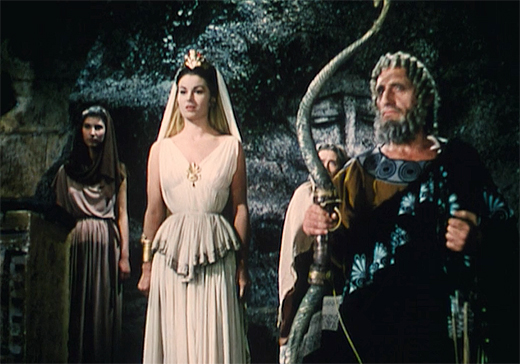 |
| "Step right up gents! String Ulysses' bow and win the fair Penelope! Who will be first? Don't be shy!" |
Others have not been so impressed with the star of the show. Douglas’ portrayal reminded one contemporary reviewer of “a Villanova halfback on summer vacation in the Mediterranean.” [Wendy Wilson and Gerald Herman, World History on the Screen: Film and Video Resource, J. Weston Walch, 2003, p. 3]. A little more charitably, reviewer Tony Thomas thought that Douglas played “the Greek super-hero with brawn and vitality, but all too obviously [looked] like an American actor cast in an Italian picture.” [Tony Thomas, The Films of Kirk Douglas, Carol Publishing Group, 1991, p. 111]
In his book on war veterans in film, Emmett Early is perhaps overly harsh in his assessment of Ulysses, but does give voice to some common complaints about film adaptations of classic works:
“Italians should never be trusted to portray the Greeks’ own Odyssey. [Editor’s note: Ouch!] For one, most of the names are changed. Odysseus becomes Ulysses. Poseidon becomes Neptune, although for some reason Athena gets to keep her Greek name … In this Ulysses the actors are so stiff they seem like Monty Python cartoon figures with their mouths moving. Kirk Douglas plays the war veteran and Anthony Quinn plays Antinoös, the chief rival among the suitors. The script does violence to the story with horrible distortions and plot compressions. For example, when Ulysses is washed ashore at Phaeacia, he has no memory of his adventures or his own identity. As his memory returns, the story unfolds, such as it is. This dramatic ploy deprives Ulysses of his chief attribute, his metis, or ability to deceive. … Kirk Douglas, for his part, made a passable adventurer, but he would have been better off trading roles with Anthony Quinn. Quinn would have made a great Antinoös and Anthony Quinn has the sturdy build that Homer attributed to Odysseus.” [Emmett Early, The War Veteran in Film, McFarland, 2010, pp. 82-83]
Whatever else the movie’s faults, Harold Rosson’s cinematography is not one of them. (On Ulysses’s IMDb page, Mario Bava is only listed as an uncredited camera operator.) Even watching a muddy, standard definition print, you get a sense of how great the outdoor vistas and the moody shadows of Polyphemus's cave and Circe’s lair must have looked on a real movie screen back in the day.
At practically any point in the film, you can freeze it and have something worthy of framing, or maybe putting on a deluxe postcard. Come to think of it, what if Ulysses had taken the trouble during his long voyage to send a postcard or two?...
______________________
______________________
______________________
______________________

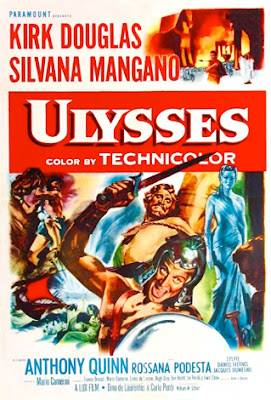
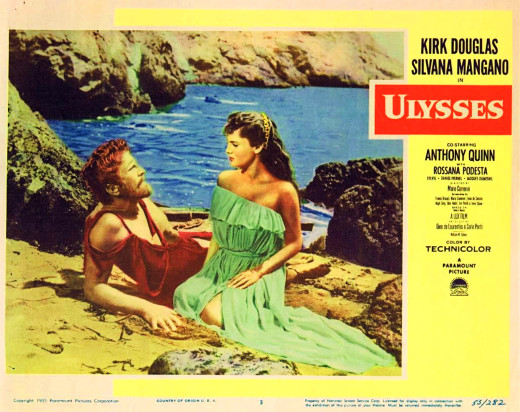

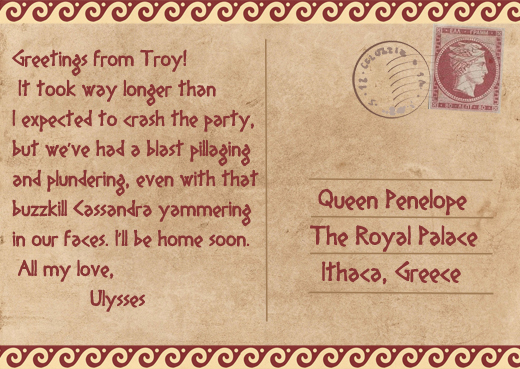
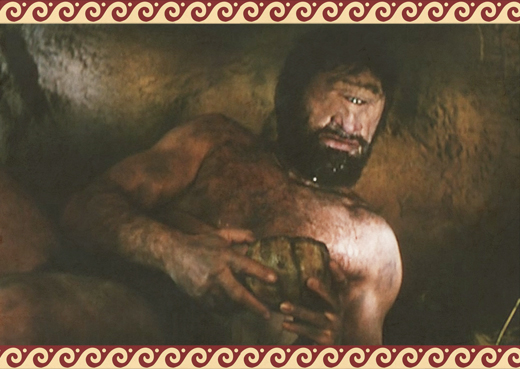
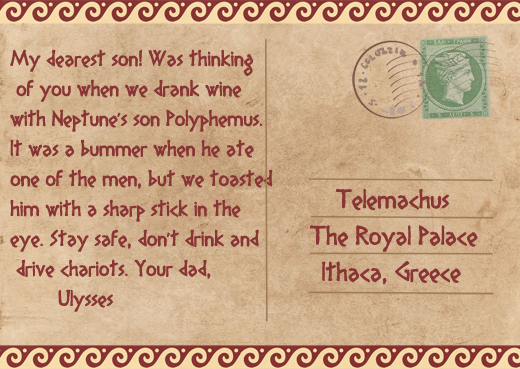



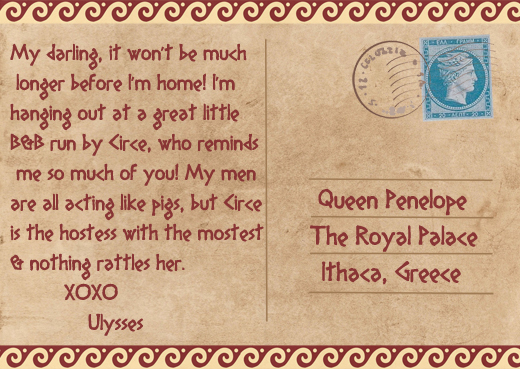

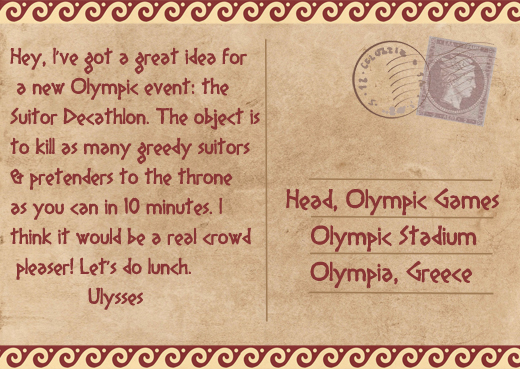
I really appreciate all the background and research you've done for this great post. Some of the behind-the-scenes stuff is amazing! (Mario Bava? Ben Hecht? Wow!) I kinda agree with the reviewer who thought Douglas was a bit too American Football for the role, but you always have to admire Douglas's energy. I remember how much pizzazz he brought to his part in The Vikings; I think he liked movies that gave him a lot of physical action to perform onscreen.
ReplyDeleteYes, Douglas had a sort of seething energy thing going on, as if he was ready to explode at any moment. He started off in a couple of noirs as a slick clothes horse, but fortunately for his career he found his niche in all kinds of action roles - westerns, fantasy-adventure, historical, etc.
DeleteLove the postcards! Although, I think they'd be too small for Ulysses, what with his love for lengthy internal monologues. :-)
ReplyDeleteThanks Rebecca! I see your point about postcards being the wrong medium for the great hero. ;-)
Delete